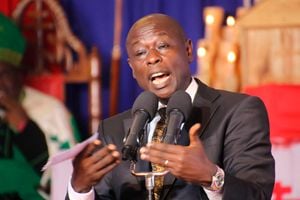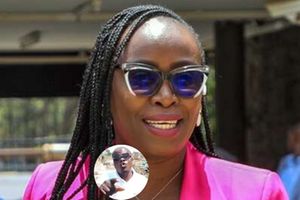15 years on, Otunga inches closer to sainthood

An undated photo of the late Maurice Cardinal Otunga. Thousands remember the prelate with affection and gratitude. FILE PHOTO | NATION MEDIA GROUP
What you need to know:
- During his 40 years as a serving bishop, the late prelate made a deep imprint on the fabric of Church and society.
- He was very clear in his mind that the mission of the Church is to be mother and teacher, borrowing the phrase of Pope John XXIII.
This year marks the 15th anniversary of the death of Servant of God Maurice Otunga, the much-loved Archbishop of Nairobi and Kenya’s premier cardinal. His cause for sainthood is now in its Roman phase.
The making of a saint in the Catholic Church is a long and rigorous process. Church officials in the country have submitted to the Vatican the evidence required for scrutiny to enable the candidate inches closer to sainthood.
John Cardinal Njue, the Archbishop of Nairobi, being the principal petitioner in the process, is hopeful that the Congregation for the Causes of Saints in Rome will recommend the promotion of the Servant of God to the next stage by being declared Venerable, the title given before beatification and finally canonisation as a Saint.
Cardinal Njue and his Beatification Office in Nairobi are appealing to the faithful and people of goodwill to pray fervently so that the Cardinal Otunga process makes good progress.
GOOD INFLUENCE
During his 40 years as a serving bishop, the late prelate made a deep imprint on the fabric of Church and society. He was a good influence on institutions and a strong role model. One sector in which he exercised beneficial impact is education. He was very clear in his mind that the mission of the Church is to be mother and teacher, borrowing the phrase of Pope John XXIII.
Maurice Cardinal Otunga — simply “MCO” to many who revere, love and admire him — saw the Church, not just as the teacher of doctrine, but also as an instructor in family and human values alongside promoting a milieu conducive to imparting skills in the arts and the sciences.
For him the issue was not whether the Church may participate in education endeavours, but that it is imperative for the community of faith to have a presence at all levels of learning.
In his thinking, evangelisation and education have a powerful symbiotic relationship. And the Church should not just seek to be in attendance, but it must contribute actively in initiating and sustaining educational institutions and programmes.
LEGACY
His legacy in education is visible, not only in the institutions he helped found, but also in the manner he mentored practitioners of pedagogy.
He left a huge legacy from which current and future players in the field of education can learn lessons as they address contemporary and emerging challenges.
One of the major crises he and other Church leaders faced came in the wake of the Education Act 1968 that transferred the management of schools from Christian missionary bodies that had founded them to the government. The very opening sentence of Education Act 1968 Section 3 (1) read: “It is the duty of the Minister (of Education) to promote the education of the people of Kenya and the progressive development of institutions … under his general direction or control”. The confrontations and negotiations between Church and state during this period of transition were trying and difficult.
There were only two indigenous Catholic bishops in Kenya in 1968: Maurice Otunga of Kisii Diocese and Caesar Maria Gatimu of Nyeri. Their principal negotiator was Msgr John Njenga, then Catholic Education Secretary General. Dr Julius G. Kiano, Minister of Education, headed and articulated the government position.
RELIGIOUS TRADITION
The upshot of the negotiations was that, while the Minister of Education took control of management of teaching and learning in the republic, Church bodies were granted a role called “sponsorship” in which they had a part to play in the appointment of the Board of Governors and a guarantee of the continued religious tradition of the school. But the appointing authority of heads and members of boards remained the government minister.
His experience in education, diplomatic service and diocesan administration stood him in good stead to negotiate with the government.
His achievements in the education sector include the opening of many schools, especially for girls, encouraging local communities to support their parishes and schools, fostering a healthy relationship with missionary bodies and insisting on a value-based teaching approach that seeks to build character.
In the last few years, our education system has been responding, and sometimes reacting, to various challenges including access, gross enrolment ratios, transition rates, performance in national examinations, funding and the relevance of courses in relation to the real needs of society.
NATIONAL ETHOS
The Kenya Constitution 2010 lists and defines 17 national values, beginning with patriotism. As education institutions seek to offer market-driven courses, one wishes that a way can be found to anchor these values in our school and college curricula so that they become part and parcel of our national ethos.
Maurice Cardinal Otunga was a veritable patriot. Without trying to be the centre of attention, he occasionally described with pride and humility how, when Kenya was attaining independence, he prayed over and blessed with holy water the flag that was hoisted up the mast as the Union Jack descended.
Fr Lawrence Njoroge was Cardinal Otunga’s Education Secretary at the Holy Family Basilica 1981-82, and is now Professor of Development Studies and Ethics in JKUAT where he serves as Catholic Chaplain [email protected]





